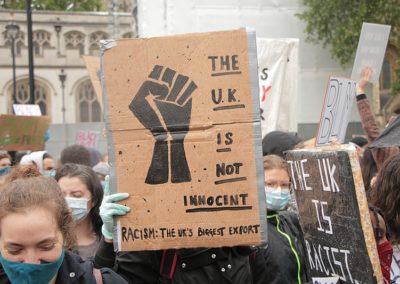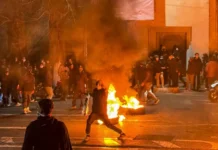The close connection between racism and British capitalism has been re-examined by many workers and young people in recent years, particularly following the international wave of Black Lives Matter protests in 2020.
Daniel Hood and Paul Gerrard, Socialist Alternative (ISA in England, Wales & Scotland)
(This article was first published on 15 October 2024)
lack oppression is as old as the capitalist society that we live in, acting as one of the key pillars propping up the capitalists’ divide and rule strategy. In recent years, we have seen a new iteration of this in the Tories’ culture war rhetoric. The new Labour government seems set to continue with this, given Keir Starmer’s recent meeting with far-right Italian Prime Minister Georgia Meloni to discuss Italy’s ‘offshore asylum’ plan.
Racist foundations of British capitalism
The close connection between racism and British capitalism has been re-examined by many workers and young people in recent years, particularly following the international wave of Black Lives Matter protests in 2020.
Many have correctly pointed out that modern Britain was built on slavery. Through its role in the slave trade, the British ruling class acquired vast wealth, while financing the growth of the industrial revolution. Slavery provided the cheapest form of labour possible at the time under the developing capitalist society. Generations of Black people were robbed of their cultures and languages, made to work in unsafe and unsanitary conditions for their entire lives and were subject to the most extreme forms of abuse and violence. To justify this horrific exploitation, and to prevent any ideas of united struggle between black and white labourers against their oppressors, racist ideas were propagated, sowing division.
Even still, the history of slavery is also a history of inspirational struggles for freedom — from the escape of slaves through the ‘underground railroad’ in the US, through to the Haitian revolution led by Toussaint L’Ouverture, which saw enslaved Haitians gain their freedom and establish Black rule.
But even as slavery declined, in the face of growing opposition and newer, more efficient industrial methods of production, racism persisted as a tool for capitalist domination. As the ‘scramble for Africa’ and the growth of imperialism took place in the latter half of the 1800s, the capitalist class had a ready-made toolkit of ideas to justify their domination of the globe. Meanwhile, nationalist ideas were pushed in the face of an emerging workingclass movement, to replace the idea of working-class solidarity and internationalism with the false idea of ‘unity of the nation’ and the ‘race’.
BLM exposed the horrific role that slavery and Black oppression had played in the development of capitalism in the UK, still commemorated in the naming of public spaces and institutions after slave owners, prompting many local struggles to remove statues and re- name spaces. This has had a significant impact on consciousness, especially but not exclusively among young people. The Guardian recently commented in relation to the British Social Attitudes survey that “pride in Britain’s history has fallen sharply over the past decade, as the country has become less nationalistic and jingoistic and more reflective about its place in the modern world.”
Black oppression in Britain today
But while this sea change in public opinion is significant, the wave of protests inspired by the George Floyd rebellion in the US did not put an end to racist oppression in Britain. Indeed, it is still part of the daily experience of Black people. Racism will not disappear until capitalism does, since it functions to prevent workers of whatever skin colour from uniting against their common enemy.
Racism in Britain, over recent decades, has been particularly fuelled by anti-migrant propaganda. This has especially been the case since the arrival of large-scale immigration from Commonwealth countries, promoted by the UK government in order to meet post-WWII labour shortages. There were of course Black people in the UK before this, particularly in port cities like Cardiff, Liverpool and London. But this ‘Windrush generation’ meant a significant influx of Black workers, many of whom were employed in the railways and the newly-formed NHS. The ‘welcome’ they received, however, did not extend to living conditions, as many black workers looking for flats found signs in windows saying ‘no dogs, no blacks, no Irish’. Where they were able to rent a property, they often found themselves living in substandard, rat-infested accommodation.
Racist attitudes were deliberately stoked up in order to divide the working class. In 1968, Conservative politician Enoch Powell gave his now-infamous ‘rivers of blood’ speech, where he attempted to prophesise that the Black and ethnic minority population would cause a civil war against their white neighbours. Far-right groups made gains, recruiting a layer of young people by falsely claiming that unemployment and economic hardship were the fault of migrant workers. Of course, such ideas are often at the foundation of the racist narratives which are put forward even today.
Nigel Farage and Reform UK’s alarming rise in support in the July General Election was based in part on the idea that immigration must be stopped to deal with strain on the NHS, schools and other public services. But such ideas are echoes of the same racist propaganda of the Tories and Labour, who have whipped up a fervour over ‘small boats’.
Prominent in the list of people arriving in the UK by crossing the channel in ‘small boats’ are people from across Africa and the Middle East, many of whom are fleeing countries which have been wrecked by imperialism and its wars. Increasingly, this also includes climate refugees. Already migrants from sub-Saharan Africa, driven from their homes by alternate floods and droughts, are attempting to cross the Mediterranean to Italy. Rising sea levels in the Indian Ocean and elsewhere are forcing coastal populations in Bangladesh to uproot, while melting snow in the Himalayas has already had a devastating impact in Pakistan. Climate change is the poisonous heritage of capitalism in its final decline, and it is overwhelmingly those from the ‘Global South’ who bear the brunt.
The recent racist riots were instigated by the far right, leaning on centuries-old myths about Black people being violent, predatory or criminal — but the seeds of these violent rampages were sown by the capitalist establishment themselves, who have spouted this xenophobic rhetoric over months and years.
These ideas have gained a base among some sections of society, who feel the real pressures of collapsing public services, rampant poverty and social alienation. However, it is the politicians and press of the ruling class which steers this frustration toward racist ideas. It is for this reason that Marxists make the point that racism ultimately comes ‘from the top’. Racist, backward and bigoted attitudes can be expressed across all of society, and need to be challenged, including within the working class. But to get to the roots, a socialist strategy to resist racism needs to target the ruling class which perpetuates and ultimately benefits from it.
Institutionally racist
Racism is a daily feature of the functioning of the British state. This is seen most egregiously in the case of police treatment of Black people.
High-profile cases of wrongful arrest and harassment, as well as deaths in custody, have been widely reported. These issues are not restricted to the Met but are also rife in other police forces. It was at Manchester Airport only a few months ago that video footage emerged of a police officer violently assaulting a British Asian man.
Nor is biased treatment limited to the police. According to the Department for Work and Pensions, Black Universal Credit claimants are 58% more likely to be sanctioned than white claimants. Statistics from the NHS show that Black women are 3.7 times more likely to die during or in the first year after pregnancy than white women. Black women in childbirth frequently report not being listened to and denied pain relief, due to the myth that they can tolerate higher levels of pain.
Perhaps the most dramatic case of Black people being ignored has been revealed in the Grenfell Tower inquiry, where tenants’ concerns were consistently dismissed by the council and the housing association. Of the 72 that perished, 61 were of an ethnic minority background. Persistent unscientific myths, individual acts of discrimination and institutional racism combine to blight the lives of Black people.
Working-class solidarity
The anti-racist solidarity that has been on display in the multi-racial BLM protests, anti-raids networks, and trade union struggles of migrant workers in recent years points toward the importance of connecting the struggle against racism with the struggle of working-class people against all oppression and exploitation.
The working-class movement at its best has supported Black people in their struggles. The slave revolt in Haiti was supported by the revolutionary masses of Paris. In 1970, when super-exploited migrant women workers, mostly from South Asia and East Africa, struck against poverty wages at Grunwick, Yorkshire miners headed to London in support of their mass pickets. In recent years, the RMT trade union has consistently fought for mostly ethnic minority cleaners on the railways.
Where trade unions fail to effectively reach out and organise migrant workers, socialists say there must be a determined struggle to make them do so. Such methods are crucial to cutting across racist division, and highlighting that workers of all backgrounds gain from a united struggle for our shared interests.
Black History Month has been used by capitalist institutions in what is often a tokenistic or ‘box ticking’ way. This sometimes includes the spotlighting of successful individuals, without properly questioning why the vast majority of Black people face lower living standards and less opportunities, only reinforces the capitalist system responsible for our oppression.
This is why the fight against racism must mean building a mass struggle, on the streets, in our workplaces and communities. Ultimately, we need to take on the racist capitalist system as a whole. It is only the multi-racial working class which can end capitalism and, on the basis of worldwide socialism, begin to break down the prejudice, discrimination and oppression bred over centuries.
We say:
- No to racism, fight the far right, including with organised self-defence in black and immigrant areas
- Expel members of far-right and fascist organisations from the trade unions
- Drive the racists out of the police force – for community control of the police
- Abolish the ‘sus’ laws and other oppressive legislation
- For a democratic socialist society in which the needs of all are met, and which can lay the basis for ending all forms of oppression




